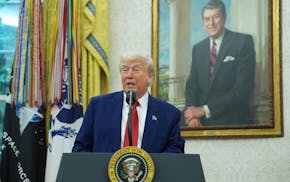Wall Street bankers and executives are privately warning the Trump administration that the tax bill moving through Congress could stoke investor anxiety about rising deficits, push up U.S. borrowing costs and damage the broader economy, according to more than a dozen people familiar with the matter.
House Republicans this month approved a measure projected to add $2.3 trillion to the national debt over the next decade, primarily by extending tax cuts from 2017 — and it would add more than $5 trillion in debt including interest costs and likely future extensions, according to the nonpartisan Committee for a Responsible Federal Budget. That legislation, which would also beef up immigration enforcement and defense spending, is President Donald Trump's top legislative priority. The Senate is due to take it up soon.
But recently, a growing number of figures from the financial world have expressed private concerns that such an expensive bill could rattle the U.S. bond market, a cornerstone of the global financial system and the national economy. Most have been reluctant to raise their worries publicly, instead passing them along in smaller meetings or through trusted confidants, said the people familiar with the warnings, most of who spoke on the condition of anonymity to discuss sensitive talks.
White House officials have pushed back against these criticisms over the past week, arguing that fears about the bond market are overstated and that warnings about the deficit impact of Trump's first tax bill were also exaggerated.
The federal government borrows money — issued as Treasury bonds — to fund the gap between what it spends and what it brings in through taxes and other revenue. The almost $30 trillion market for U.S. debt influences the interest rates for other lending, including mortgages and auto loans, as well as for debt issued by private companies. Experts warn that too much government borrowing could send already-elevated interest rates soaring, as investors demand higher yields to cover the increased risks that the United States might eventually default. Even before it becomes law, the tax bill has helped to fuel a spike in Treasury yields, with the 30-year bond recently surging past 5 percent — an important psychological threshold — before receding.
In April, the bond market fluctuated wildly because of the chaos caused by Trump's massive proposed tariffs on U.S. trading partners, but stabilized as the president backed off those proposals. Now many economists and Wall Street analysts fear a potential reprisal of that turbulence if global investors prove unwilling to snap up massive amounts of U.S. debt at current prices.
The U.S. government has run large deficits for decades, but concerns about borrowing are intensifying because interest rates are at their highest in years, making it more expensive to service the debt. And neither Trump's tariffs nor attempts to cut spending in Washington appear likely to change the overall fiscal trajectory.
One member of the panel of private financial institutions that advises Treasury on its borrowing, speaking on the condition of anonymity for fear of reprisals, characterized the tax bill as a "poisoned chalice" that is raising anxiety levels in the bond market as debt-service payments crowd out other forms of government spending. Eventually, there might not be enough demand among investors to buy a glut of new debt, requiring the government to pay even more interest to attract buyers — driving up borrowing costs across the economy, the official said.
"We are operating at really high levels of debt and deficits, and the bond market is increasingly worried about it," the official said.
Long-term borrowing costs will probably continue to rise over the coming years as the U.S. competes alongside a range of big borrowers — from other governments to infrastructure companies — to attract a finite pool of bond investors, said Robin Vince, chief executive of BNY, a global bank.
The tax bill could exacerbate that pressure on bond yields if it's constructed in a manner that spends a lot of money without adding to growth, he said. On the other hand, the bill could yet fuel growth in a way that helps pay for a significant amount of additional government borrowing, Vince said.
"There could be a $3 trillion deficit bill that doesn't really create a lot of economic impetus — that will be very poorly received — as opposed to a $3 trillion bill, which investors perceive to have a lot of economic kick-starting associated with it," Vince said in an interview.
JPMorgan Chase CEO Jamie Dimon has also spoken publicly about debt risks, while praising the tax bill as important for fueling growth.
"You are going to see a crack in the bond market," he said Friday, speaking at the Reagan National Economic Forum. "I don't know if it's going to be a crisis in six months or six years."
Senior Trump officials have stepped up their defense of the legislation, with White House officials such as trade counselor Peter Navarro and economic adviser Kevin Hassett this week dismissing concerns about the effect of the tax bill on the bond market. Navarro has argued that financial markets should be more skeptical of the estimates from the nonpartisan Congressional Budget Office, saying markets were neglecting the "substantial positive revenue impact" from Trump's tariffs. Administration officials also believe the Federal Reserve is likely to cut interest rates in the coming months, citing continuing progress on inflation, which will relieve bond market pressure. The administration may also make more spending cuts through the U.S. DOGE Service, despite billionaire Elon Musk's departure from government.
Republicans have also pointed out that the Biden administration signed into law a $1.9 trillion stimulus plan in 2021 and backed other expensive initiatives, such as hundreds of billions of dollars in student debt relief. One White House official, speaking on the condition of anonymity to discuss the administration's position more freely, said aides do not see bond yields as currently being unreasonably high.
"Pundits and portfolio managers alike insist the bond market vigilantes are delivering a decisive and unmistakable rebuke of President Trump's One Big Beautiful Bill Act and its tax cuts," Navarro said in an op-ed published Wednesday in the Hill. "Go a bit deeper, however, and it is clear that financial markets do not have complete information."
Brian Smith, acting assistant secretary for financial markets at the Treasury Department, also said in a statement in April that the government is "well positioned to address potential changes to the fiscal outlook."
And many economic policy experts outside the administration say the fears about bond market impacts may prove overstated. The costs of corporate, household and other forms of borrowing have remained relatively stable over the last few years, and nothing in long-term yields is particularly alarming for now, said Matt Klein, a financial analyst at the Overshoot. Mortgage rates remain one percentage point lower than they were in 2023, and borrowing across the economy is at the "low end" of historic norms because of strong income growth and healthy balance sheets, Klein said.
"The deficit is unusually large relative to the state of the economy — OK, that's been true for a while," Klein said. "As of now — and maybe things will change a lot — but it seems as of now that we still have a situation where the U.S. government borrows at interest rates lower than the nominal growth rate, which does not suggest there's some extreme pressure there."
Still, the concerns have reached Senate Republicans, who are trying to pass the legislation before Congress leaves town again for July 4. While the legislation is expected to enjoy support across the GOP caucus, Sen. Rick Scott (R-Florida) has said he plans to vote against it for now, citing concerns about rising borrowing costs tied to the bond market.
"We're having trouble selling long bonds. The investors are telling us we have too much debt, we have too much deficit," Scott said in an interview last week. "The bond market is telling us we have to get our fiscal house in order. And if you care about the voters of this country — they want inflation under control, they want lower mortgage rates, they want lower car payment rates, and they want lower interest rates on their credit cards."
One economist who spoke this month with a senior White House official said numerous Wall Street analysts have told senior officials about potential bond risks.
"The administration is getting this message through multiple channels — regular interactions with business groups, one-on-one meetings, dinner parties," the person said. "What they're hearing from people on Wall Street and in business is that there's no good reason for the U.S. to increase deficits by this much."
Even if anticipated Fed rate cuts in the second half of 2025 help contain short-term borrowing costs, the combination of the tax bill and tariff-fueled uncertainty "sets the stage for a higher term premium," or higher borrowing costs, according to the Institute of International Finance, a global financial industry group.
"The implications of rising U.S. debt levels are not limited to the domestic economy," the group said on May 22. "They are also likely to trigger significant contagion and spillover effects across global bond markets."
Fueling the uncertainty is a deteriorating fiscal projection beyond the tax cuts. Musk's DOGE does not appear to have slowed the pace of federal spending overall, according to a tracker by the Hamilton Project, a Washington-based think tank. Trump has also long said that large-scale tariffs may bring in enough revenue to offset the deficit impact of the tax bill. But a U.S. trade court on Wednesday night ruled that most of Trump's tariffs are illegal, clouding the likelihood that the import duties help reduce deficits. (An appeals court reversed that ruling temporarily, but the fate of the tariffs remains unclear.)
And the tax legislation itself is on track to be more expensive than many analysts initially projected. Republicans had initially considered substantial cuts to health-care spending and other programs. While the House-passed bill includes some reductions to Medicaid and food stamps, they represent a small fraction of the cuts originally eyed, further increasing the potential fiscal hit.
"I don't just hear it from D.C. policy people, I'm hearing it from market participants. When you're hearing it from the people who are actually trading on the information, that gives it a much higher level of credibility than people trying to use it for political purposes," said George Callas, who served as senior tax counsel to former House speaker Paul D. Ryan (R-Wisconsin) and now leads the public finance team at Arnold Ventures, an advocacy group. He added of Wall Street investors: "They're saying they're really worried about Congress's fiscal policy. Those warnings are really growing. If you don't hear them, it's because you don't want to hear them."
Investors have been trying to "get this issue in front of lawmakers," including the administration, said Gordon Gray, executive director at Pinpoint Policy Institute, a center-right think tank.
"There has been an effort to inform lawmakers and get them connected to financial market observers and participants about the fiscal risks and that those risks are rising," Gray said, "and that they could have very real impacts to the bond market."
Theodoric Meyer contributed to this report.

31 Palestinians are killed heading to a Gaza aid site, witnesses say. Israel denies responsibility
Amtrak's Borealis beat ridership expectations in first year. Minnesota wants to build on its success.

Hot, dry weather challenges wildfire suppression efforts in northeastern Minnesota
Two people injured in shooting outside University of Minnesota arena released from hospital
